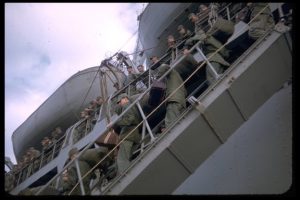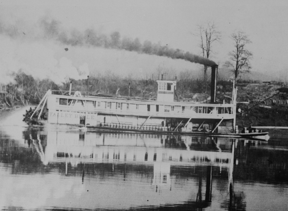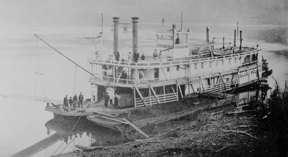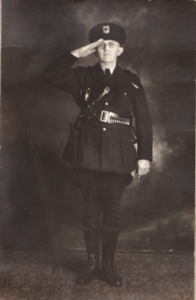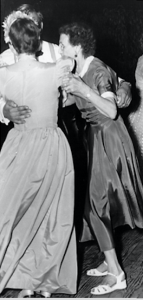After spending a summer working in the strip mine I entered Kent State University but I had no idea what I wanted as a career. I started a pre-med course but had no desire to become a doctor. After 2 years of classes I still didn’t know. This lack of direction made it difficult for me to study and my grades began to suffer. To add to the problem, I was working almost full time at Fenn Dairy . I bought a 1940 Ford so I could commute to Kent, and my parents furnished meals and allowed me to stay at home. I would get up at 3AM and work until around noon, then go to class, many times not having time to change clothes. Then my father became ill and did a stint in the hospital, so I decided to drop out of school.
About 3 months later I received this envelope in the mail:
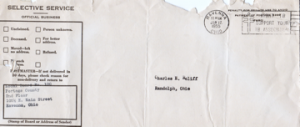
Which contained this letter:
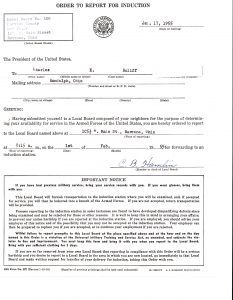
As you can see it was from my “neighbors” at the Portage County Draft Board telling me that I had been drafted to serve in the military, and to show up at the bus station in Ravenna where a bus would take me and others to Cleveland for a physical exam and intelligence tests.
When we arrived in Cleveland at the Federal Building, a sergeant herded us into a room with high ceilings and long marble benches and told us to strip.
So there we stood between the marble benches, shivering, scared, naked as bird’s butts, and wondering what was going to happen next. The sergeant then shouted,
“ Readyyyy, SIT”. Everyone “SAT”.
When those bare bottoms hit the marble benches in unison it sounded like a round of applause echoing through the room. The doctor came in, inspected us for lice, looked in our ears and other “hard to reach places”, gave us the “cough test” (turn your head and cough), etc.
I don’t remember much about the written test except that it was slanted toward those who didn’t read at a very high level. For example, it showed a drawing of a wrench, then showed drawings of wrenches oriented in different directions and asked which drawing depicted the original wrench. At that time the average level of education of a draftee was 6th grade.
I must have passed everything because soon I was on a train headed for Ft. Knox, KY.
Basic training was somewhat traumatic – especially for those boys who were out of shape. I was used to going without sleep, and I didn’t have trouble with the physical part since I had been running in and out of stores carrying 55 pound cases of milk every day for Fenn dairy. The harder part was putting up with the cadre trying to destroy our identity by shouting in our faces, insulting us, and generally trying to make us feel worthless. They made it especially tough on those who didn’t conform.
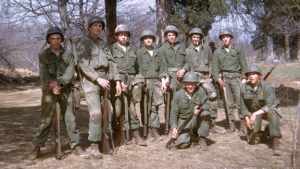
Infantry squad, basic training at Ft. Knox, KY (author on right) c. 1955
Shoes had to be spit-shined and lined up. All foot locker lay-outs had to be exactly alike including a pack of Lucky Strike cigarettes in the upper left hand corner. I didn’t smoke but I still had to buy cigarettes to display in the foot locker.
There were several training sessions on taking apart and cleaning the M1 rifle. We broke it down into small pieces, each part was cleaned and oiled, then it was all put back together and handed in for inspection. It didn’t matter how spotless the rifle, it never passed the first inspection. There would always be a “boulder” in the barrel (speck of dust) or a “huge rope” (small piece of fuzz) somewhere in the works. We then had to take it all apart again, clean, oil, re-assemble, etc. We finally learned to wait until midnight to hand in the rifle, because it would always pass inspection at that time since the inspectors wanted to quit and go to bed.

Author with M1 Garand rifle c. 1955
I remember one boy in particular who had a rough time conforming. For punishment the sergeant made him run around the barracks flapping his arms and shouting “I’m a big shit bird”. The sergeant was right behind him yelling, “louder, louder” in his ear. I felt sorry for the kid but it was such a funny spectacle I couldn’t keep from laughing.
Although I didn’t particularly like the soldiering stuff I could do it well enough to stay out of trouble. At the end of our 6th week I was awarded a weekend pass to go into Louisville. It was the weekend of the Kentucky Derby horse race and I had bought tickets. That morning on a whim the sergeant pulled my pass because he found a guitar under my bed, so I missed the race. I will never forgive him for that. This is the kind of “chicken $h!+” that causes “friendly fire” incidents.
For my advanced training I was schooled in fire direction for a field artillery unit. This involved geometry, slide rules and map-reading and I found it to be quite interesting. We would use information from a forward observer to locate the position of the target on a map, translate this into numbers the guns could use, and then pass these data to the gun batteries. This was actually fun!
But it was still the army, and we had a captain in charge of our unit who thought he was either Napoleon, Caesar, or Attila the Hun.
Our job at the time was to put on a combat demonstration for important officers. They would sit in bleachers and observe military maneuvers being carried out in a large field. First planes would come in and drop napalm. Then the artillery (us) would shoot the place up, then the tanks came in, then the infantry, etc.
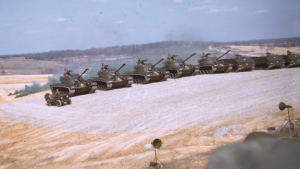
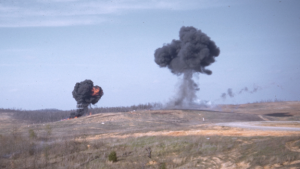
Combat demonstrations at Ft. Knox, KY. c.1955
One day I was working fire direction out of the back of a truck for one of these shows. I had the misfortune of looking up from my table and out the back of the truck for a moment. “Captain Badass” saw me and decided I was not concentrating, and that I needed an attitude adjustment. He told me to get down from the truck and start digging a hole. After I had been digging for a couple hours Captain Badass told me to fill the hole back up, then he decided that my mind was properly cleansed so he put me back in charge of directing fire.
That was a big mistake. On the next shot I moved the map pin to a point that caused the shells to land in front of the bleachers where the officers were sitting. It was still within the safety area but it deviated quite a bit from the point of attack, and that made the captain look very incompetent to the observing dignitaries.
I heard later that when the shells exploded some of the officers dived underneath the bleachers. The captain didn’t say a word to me about the incident, but the following week I was headed for Korea.
